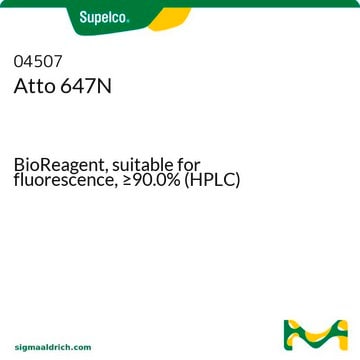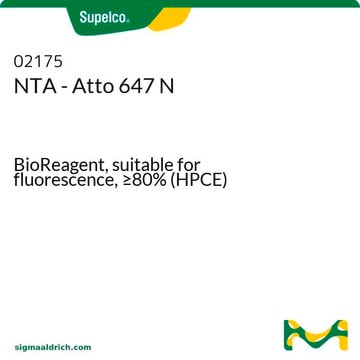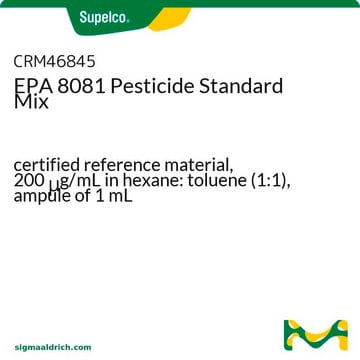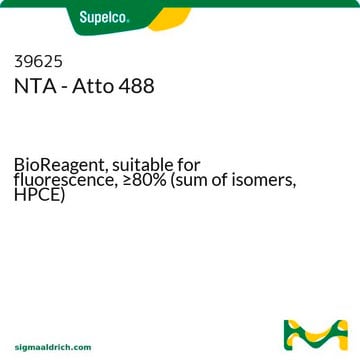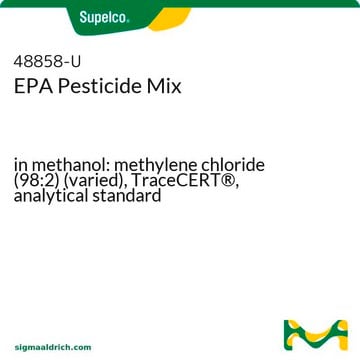76508
Atto 647N Protein Labeling Kit
BioReagent, suitable for fluorescence
Sign Into View Organizational & Contract Pricing
All Photos(1)
About This Item
UNSPSC Code:
12352108
NACRES:
NA.32
Recommended Products
product line
BioReagent
manufacturer/tradename
ATTO-TEC GmbH
fluorescence
λex 647 nm; λem 661 nm in 0.1 M phosphate buffer, pH 7.0 (recommended)
suitability
suitable for fluorescence
storage temp.
2-8°C
Looking for similar products? Visit Product Comparison Guide
General description
This kit contains sufficient amounts of reactive dye, buffers and protein purification sets for performing five labeling reactions (1 mg protein each) and for the subsequent purification of the labeled protein.
Legal Information
This product is for Research use only. In case of intended commercialization, please contact the IP-holder (ATTO-TEC GmbH, Germany) for licensing.
Storage Class Code
10 - Combustible liquids
Flash Point(F)
Not applicable
Flash Point(C)
Not applicable
Certificates of Analysis (COA)
Search for Certificates of Analysis (COA) by entering the products Lot/Batch Number. Lot and Batch Numbers can be found on a product’s label following the words ‘Lot’ or ‘Batch’.
Already Own This Product?
Find documentation for the products that you have recently purchased in the Document Library.
Customers Also Viewed
Bryant L Doss et al.
Proceedings of the National Academy of Sciences of the United States of America, 117(23), 12817-12825 (2020-05-24)
Morphogenesis, tumor formation, and wound healing are regulated by tissue rigidity. Focal adhesion behavior is locally regulated by stiffness; however, how cells globally adapt, detect, and respond to rigidity remains unknown. Here, we studied the interplay between the rheological properties
Anne Chalumeau et al.
Bio-protocol, 11(2), e3899-e3899 (2021-03-19)
β-hemoglobinopathies are severe genetic disorders characterized either by the abnormal synthesis of the adult β-globin chains of the hemoglobin (Hb) tetramer (βS-globin chains) in sickle cell disease (SCD) or by the reduced β-globin production in β-thalassemia. The identification and quantification
Alexandra Grubman et al.
Nature communications, 12(1), 3015-3015 (2021-05-23)
The role of microglia cells in Alzheimer's disease (AD) is well recognized, however their molecular and functional diversity remain unclear. Here, we isolated amyloid plaque-containing (using labelling with methoxy-XO4, XO4+) and non-containing (XO4-) microglia from an AD mouse model. Transcriptomics
Shiqiong Hu et al.
Molecular biology of the cell, 30(16), 2025-2036 (2019-06-20)
Contractile arrays of actin and myosin II filaments drive many essential processes in nonmuscle cells, including migration and adhesion. Sequential organization of actin and myosin along one dimension is followed by expansion into a two-dimensional network of parallel actomyosin fibers
Fluorescence lifetime imaging with pulsed diode laser enabled stimulated emission.
Ge, J.; Kuang, C.; Lee, SS.; Kao, FJ
Optics Express, 20(27), 28216-28216 (2012)
Our team of scientists has experience in all areas of research including Life Science, Material Science, Chemical Synthesis, Chromatography, Analytical and many others.
Contact Technical Service
